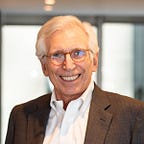For What It’s Worth: Perusing a 1960 Encyclopedia
On a shelf upstairs in our renovated barn in Lakeside, Michigan is a full set of the Encyclopædia Britannica announcing: “A New Survey of Universal Knowledge”. Ours is the 1958 edition. It has probably been there for decades, apparently a gift from the publisher, William Benton. The last printed edition was in 2010.
As far as I know, no one has ever looked anything up for as long as the books have been in residence with us. But this summer, as I passed by one morning, I decided to explore how the world looked sixty years ago. The leather- bound volumes have the look, feel and satisfying aura of classic publishing. They include 24 books that cover topics from A-Z and ten “yearbooks” covering 1956 to 1966.
The entries are written by scholars, journalists and experts of note listed alphabetically. The dance section, for instance, is attributed to Arthur Murray the owner of an eponymous national chain of dance studios. “Candy” was written by Don Gussow, publisher and editor of “Candy Industry and Confectioners Journal.” “The FBI” was written by its director, J. Edgar Hoover, which suggests that not all these ostensibly authoritative items can be regarded as objective. (More about Hoover’s entry below.) The world portrayed in these pages is stately, clearly organized by topic in traditional English grammatical style.
The 1960 “yearbook” is about 800 tightly packed pages. I started by looking at the collection of notable personalities of the year. They were almost all men. The only women were Margot Fonteyn, a ballerina; Queen Elizabeth; Golda Meir, then Israel’s foreign minister and Farah Diba, the commoner who had married the Shah of Iran at 21 in the last days of 1959. The only Negro (as they were then called) was Ernie Banks, known as “Mr. Sunshine,” star infielder for the Chicago Cubs.
The lead feature article was about Hawaii, which had become a state in 1959. “It shares with Texas,” the narrative declared, “a further distinction as the only unit in the American union to enter, not by purchase or conquest, not by discovery or occupation, but voluntarily.”
Skimming the listings, I found no category related to homosexuality and no entry for Moslem or Muslim. Under Indians-American, the subjects were archeology, law and Tuberculosis. The very long list of topics for the Union of Soviet Socialist Republics starts with Afghanistan and ends with Zinc. The U.S. listing also has Zinc at the end.
To me, the most bizarre entry was Hoover’s about the FBI. He writes: “The very nature of the FBI’s work in the internal security field precludes publication of its highly confidential activities. During 1959, however, communists continued to be active across the nation. Recent activities reflected a renewed feeling of confidence and optimism through the Communist Party. Using blackmail, bribery and similar techniques, communist agents…stepped up their efforts to obtain the nature’s military, scientific and industrial secrets. The primary targets were the establishment of a new communist youth group and infiltration of U.S. labor organizations and basic industries.”
This account reminded me of the time Hoover ordered an investigation of the Boys Clubs of America because agents confused it in wiretaps with the W.E.B. DuBois clubs named after the African-American activist and intellectual.
Hoover’s long reign at the FBI has been discredited in ensuing years by his excesses and inclination to use investigative strategies and gossip as a means of intimidation at all levels of society. The American tendency to stigmatize minorities of race, gender, national origins and political views is a constant; only the groups under attack continue to change.
I did not read enough of the yearbook to conclude that there is pervasive bias in its judgments as there so clearly was in the FBI entry. Nota bene: Donald Trump’s assaults on the vaunted agency for a variety of depredations and inadequacies. Hoover would be aghast.
What is definitely the case is that this volume reflected its time. Sixty years later it is often misleading and, in some respects, completely, even laughably wrong. Written history is the authors’ record of the past, and the yearbook shows that it should be read that way.
Another insight is that the America of 1959–60 doubtless had many of the same economic and political tensions and problems as there are today. But by contemporary standards they were generally less palpable. The private behaviors of American presidents, for instance, were not deemed worthy of scrutiny. To show how much has changed: next year’s installment of FX’s American Crime Story anthology series will be about Bill Clinton’s affair with Monica Lewinsky and the impeachment that followed. Lewinsky is a producer of the series.
What the Internet and social media have done to public discourse was far in the future. It was an age of three networks with content overseen by the Federal Communications Commission. The press could be opinionated but by today’s standards, stayed firmly in conventional lanes.
On the upside, this was the era when Newton Minow, the head of the FCC in the Kennedy administration described television as a “vast wasteland.” Television has vastly increased in scale today but cannot be called a wasteland. It is a fertile reflection of culture from the serious serial dramas to an MTV show called “Ridiculousness” which features clips of people having simulated sex (grinding) or falling clumsily (based on the one episode I saw in a gym).
Wikipedia is today’s encyclopedia. From what I have seen, there is a continuing effort to upgrade its factual reliability and maintain a tone of civility, in contrast, say, to so much of the web’s flow. In 2080, sixty years from now, I very much doubt anyone will be cruising shelves in family homes or libraries for information in elegant leather-bound objects that give off an aroma of dignity and depth that perhaps they do not deserve.
And where will Wikipedia be?
